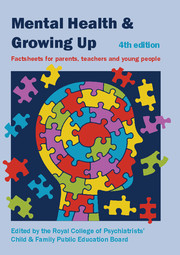Book contents
- Frontmatter
- Contents
- Contributors
- Factsheets for young people
- Factsheets for parents, carers and anyone who works with young people
- 1 Good parenting
- 2 The restless and excitable child
- 3 Dealing with tantrums
- 4 Children who soil or wet themselves
- 5 Sleep problems in childhood and adolescence
- 6 Behavioural problems and conduct disorder
- 7 Attention-deficit hyperactivity disorder (ADHD)
- 8 The child with general learning disability
- 9 Specific learning difficulties
- 10 Autism and Asperger syndrome
- 11 Depression in children
- 12 Worries and anxieties: helping children to cope
- 13 Divorce or separation of parents: the impact on children and adolescents
- 14 Death in the family: helping children to cope
- 15 The emotional cost of bullying
- 16 Traumatic stress in children
- 17 Domestic violence: its effects on children
- 18 Child abuse and neglect: the emotional effect
- 19 Drugs and alcohol: what parents need to know
- 20 Self-harm in young people
- 21 Psychosis
- 22 Schizophrenia
- 23 Bipolar disorder in children and adolescents
- 24 Obsessive–compulsive disorder in children and young people
- 25 Eating disorders in young people
- 26 Chronic physical illness: the effects on mental health
- 27 Medically unexplained physical symptoms
- 28 Chronic fatigue syndrome: helping your child get better
- 29 Parental mental illness: the problems for children
- 30 Who's who in CAMHS
18 - Child abuse and neglect: the emotional effect
from Factsheets for parents, carers and anyone who works with young people
Published online by Cambridge University Press: 02 January 2018
- Frontmatter
- Contents
- Contributors
- Factsheets for young people
- Factsheets for parents, carers and anyone who works with young people
- 1 Good parenting
- 2 The restless and excitable child
- 3 Dealing with tantrums
- 4 Children who soil or wet themselves
- 5 Sleep problems in childhood and adolescence
- 6 Behavioural problems and conduct disorder
- 7 Attention-deficit hyperactivity disorder (ADHD)
- 8 The child with general learning disability
- 9 Specific learning difficulties
- 10 Autism and Asperger syndrome
- 11 Depression in children
- 12 Worries and anxieties: helping children to cope
- 13 Divorce or separation of parents: the impact on children and adolescents
- 14 Death in the family: helping children to cope
- 15 The emotional cost of bullying
- 16 Traumatic stress in children
- 17 Domestic violence: its effects on children
- 18 Child abuse and neglect: the emotional effect
- 19 Drugs and alcohol: what parents need to know
- 20 Self-harm in young people
- 21 Psychosis
- 22 Schizophrenia
- 23 Bipolar disorder in children and adolescents
- 24 Obsessive–compulsive disorder in children and young people
- 25 Eating disorders in young people
- 26 Chronic physical illness: the effects on mental health
- 27 Medically unexplained physical symptoms
- 28 Chronic fatigue syndrome: helping your child get better
- 29 Parental mental illness: the problems for children
- 30 Who's who in CAMHS
Summary
Who abuses children?
Children are usually abused by someone in their immediate family circle. This can include parents, brothers or sisters, babysitters or other familiar adults. It is quite unusual for strangers to be involved.
How can you tell if a child is being abused?
Children may present with a variety of difficulties and behaviours depending on where, when and what type of abuse they have experienced.
It can be hard to detect long-standing abuse by an adult the child is close to. It is often very difficult for the child to tell anyone about it, as the abuser may have threatened to hurt them if they tell anybody. A child may not say anything because they think it is their fault, that no one will believe them or that they will be teased or punished. The child may even love the abusing adult. They want the abuse to stop, but they don't want the adult to go to prison or for the family to break up. Some of the signs of abuse are described below.
Physically abused children may:
• be watchful, cautious or wary of adults
• be unable to play and be spontaneous
• be aggressive or abusive
• bully other children or be bullied themselves
• be unable to concentrate, underachieve at school and avoid activities that involve removal of clothes, e.g. sports
• have temper tantrums and behave thoughtlessly
• lie, steal, play truant from school and get into trouble with the police
• find it difficult to trust other people and make friends.
Sexually abused children may:
• suddenly behave differently when the abuse starts
• think badly of themselves
• not look after themselves
• use sexual talk or ideas in their play that you would usually see only in someone much older
• withdraw into themselves or be secretive
• underachieve at school
• start wetting or soiling themselves
• be unable to sleep
• behave in an inappropriately seductive or flirtatious way
• be fearful and frightened of physical contact
• become depressed and take an overdose or harm themselves
• run away, become promiscuous or take to prostitution
• drink too much or start using drugs
• develop an eating disorder such as anorexia or bulimia.
- Type
- Chapter
- Information
- Mental Health and Growing UpFactsheets for Parents, Teachers and Young People, pp. 99 - 101Publisher: Royal College of PsychiatristsPrint publication year: 2013



